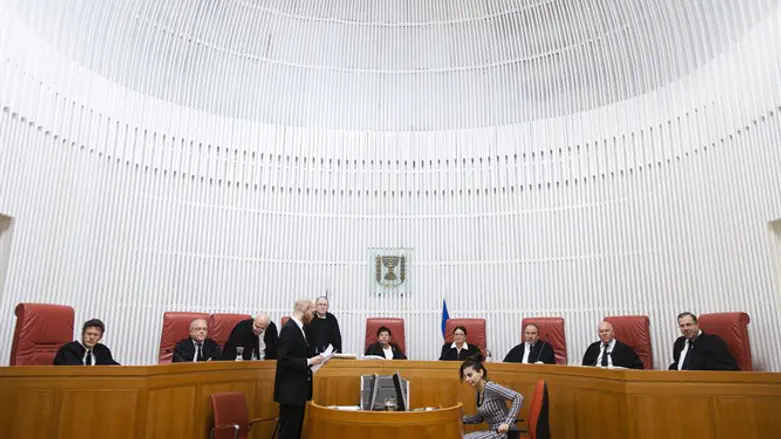
High Court judge Hanan Meltzer ordered the Supreme Rabbinical Court to respond to a petition submitted by the Mavoy Satum (Dead End) organization representing the woman who received the 'Tzfat Divorce'
The Tzfat get (divorce document) was issued by the rabbinical court in Tzfat, headed by Rabbi Uriel Lavie, to the wife of a man who has been in a coma for the past nine years. Jewish law requires a woman to receive a divorce from her husband of his own will and when he is aware of what he is doing. Rabbi Lavie employed a halakhic technique allowing the court to act as an agent for the comatose husband and presume that he would agree to divorce his wife rather than leave her married to him in his comatose state.
This technique is highly controversial and is disputed by many rabbis. For example, Rabbi Ovadia Yosef ruled, in a 10-page responsa, that there was no place granting divorce in the case of a comatose husband. The Supreme Rabbinical court, headed by Rabbi Ovadia's son, Rabbi Yitzhak Yosef, is supposed to convene soon to discuss an appeal against the divorce and to decide whether to affirm the divorce or rescind it.
The petition asked the High Court to issue a directive disqualifying Rabbi Yosef from convening the court to discuss the divorce and to direct the rabbinical court to summarily reject the appeal against the divorce.
Attorney Batya Kahane-Dror, director of Mavoy Satum said in response that "I hope that the High Court will stop this procedure, which is unthinkable in a democratic state, whereby a party which is unconnected to the case has the right to appeal a ruling in contrast to all the laws and ordinances and values of Judaism and morality on which the rule of law is based in Israel."
She maintained that "The procedure initiated by the Supreme Rabbinical court is unheard of and represents a slippery slope which endangers every woman in Israel, as well as the entire procedure regarding marriage and divorce - in addition to our existence as a Jewish and democratic state."
On November 15, Sephardic Chief Rabbi Rabbi Yitzhak Yosef signed a decision authorizing the Supreme Rabbinical Court for the first time in Israel's history to discuss the appeal against the decision of the Tzfat rabbinical court. The hearing is supposed to take place in the presence of the entire court, including both chief rabbis, and will be dedicated to examining the claims of each side for a full day and determining whether to dismiss the appeal.
The appellant is a resident of Bnei Brak who does not know the husband or wife and was not a party to the proceedings in the case until after the get was authorized.
The decision required both sides to present summaries before the hearing, which will involve discussion on whether an appellant can join the case as a party when he has no direct involvement in it, as well as the unusual halakhic aspects of the case.
The hearing may lead to cancellation of the divorce, which was given to the woman by the Tzfat Rabbinical Court headed by Rabbi Uriel Lavie after a seven-year wait.